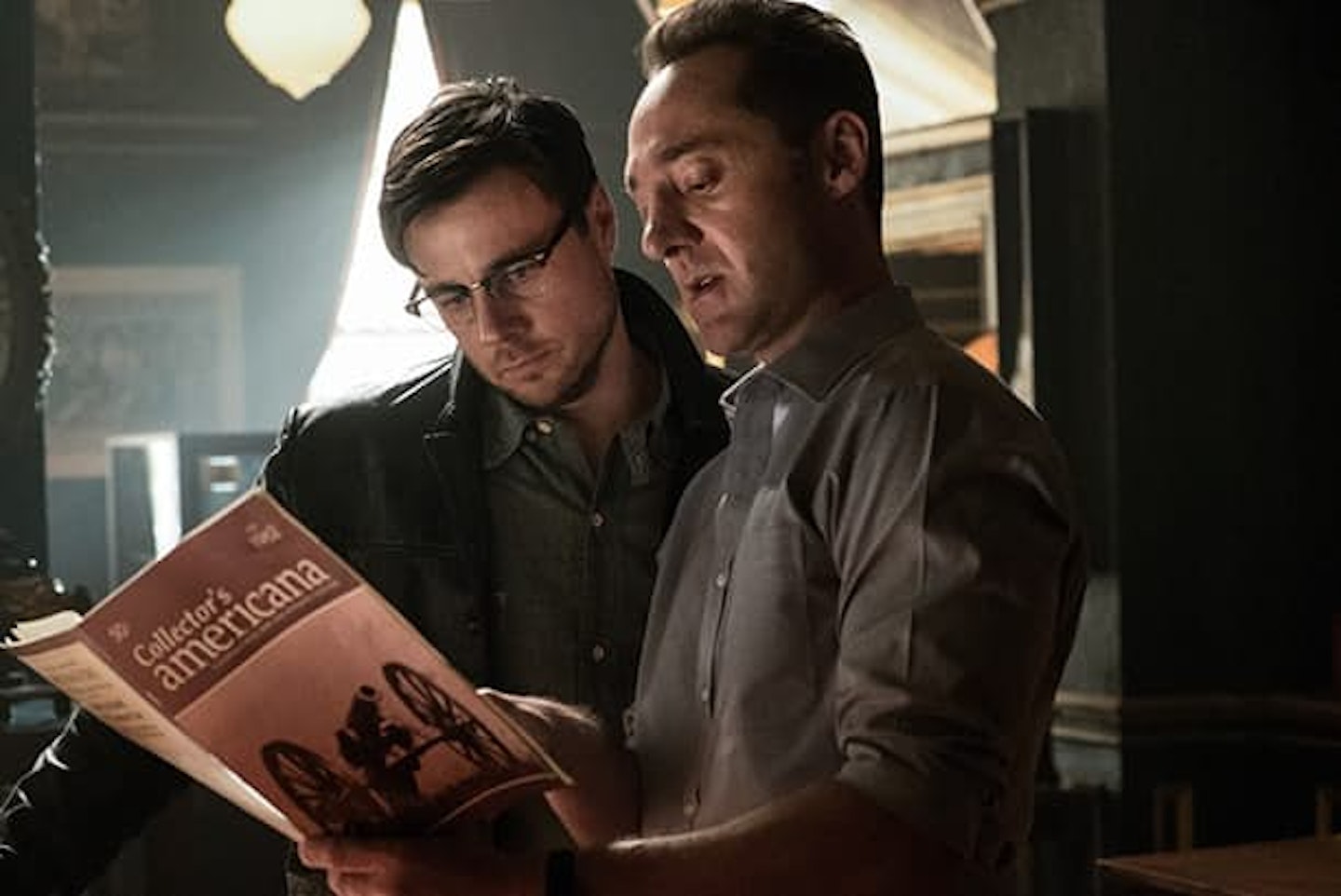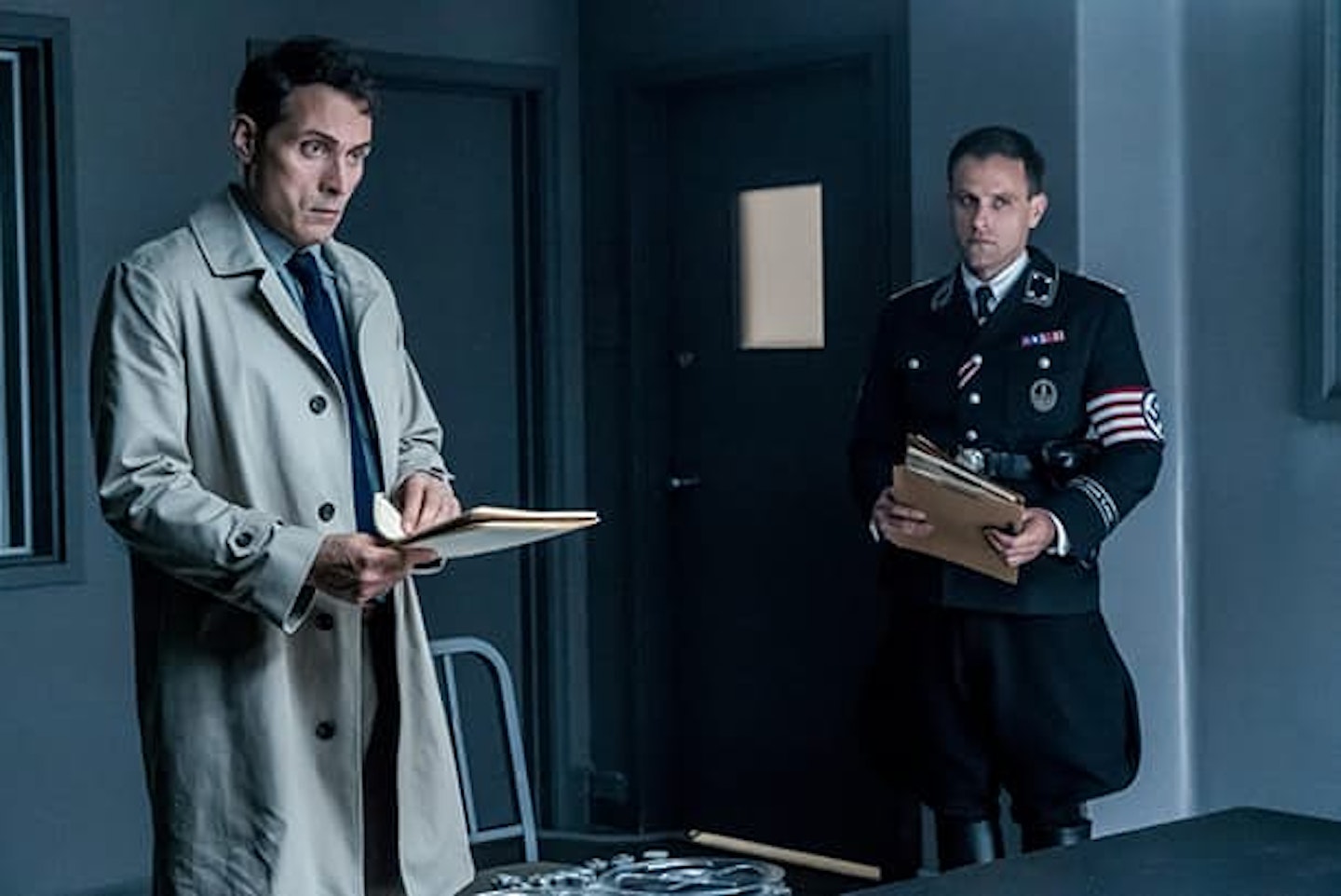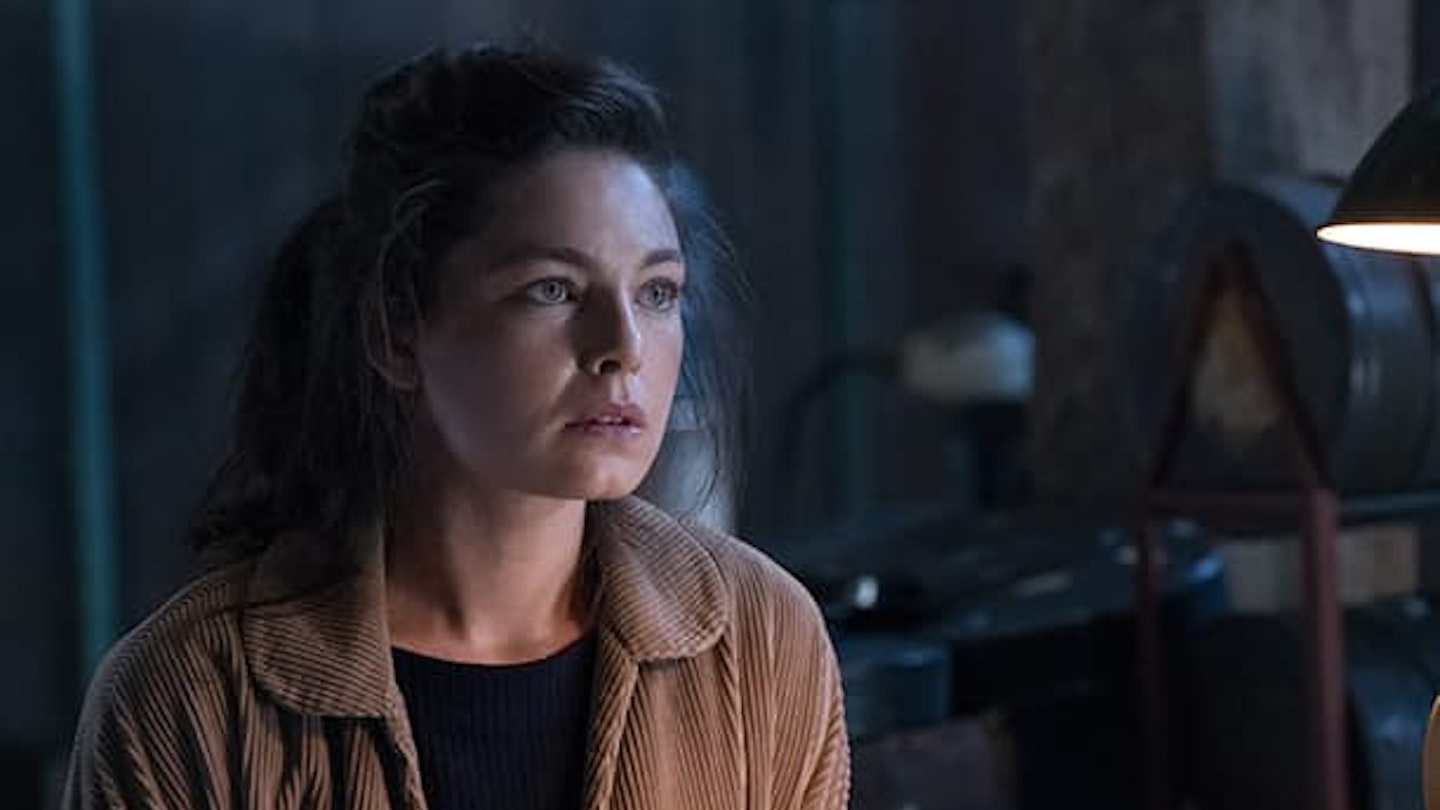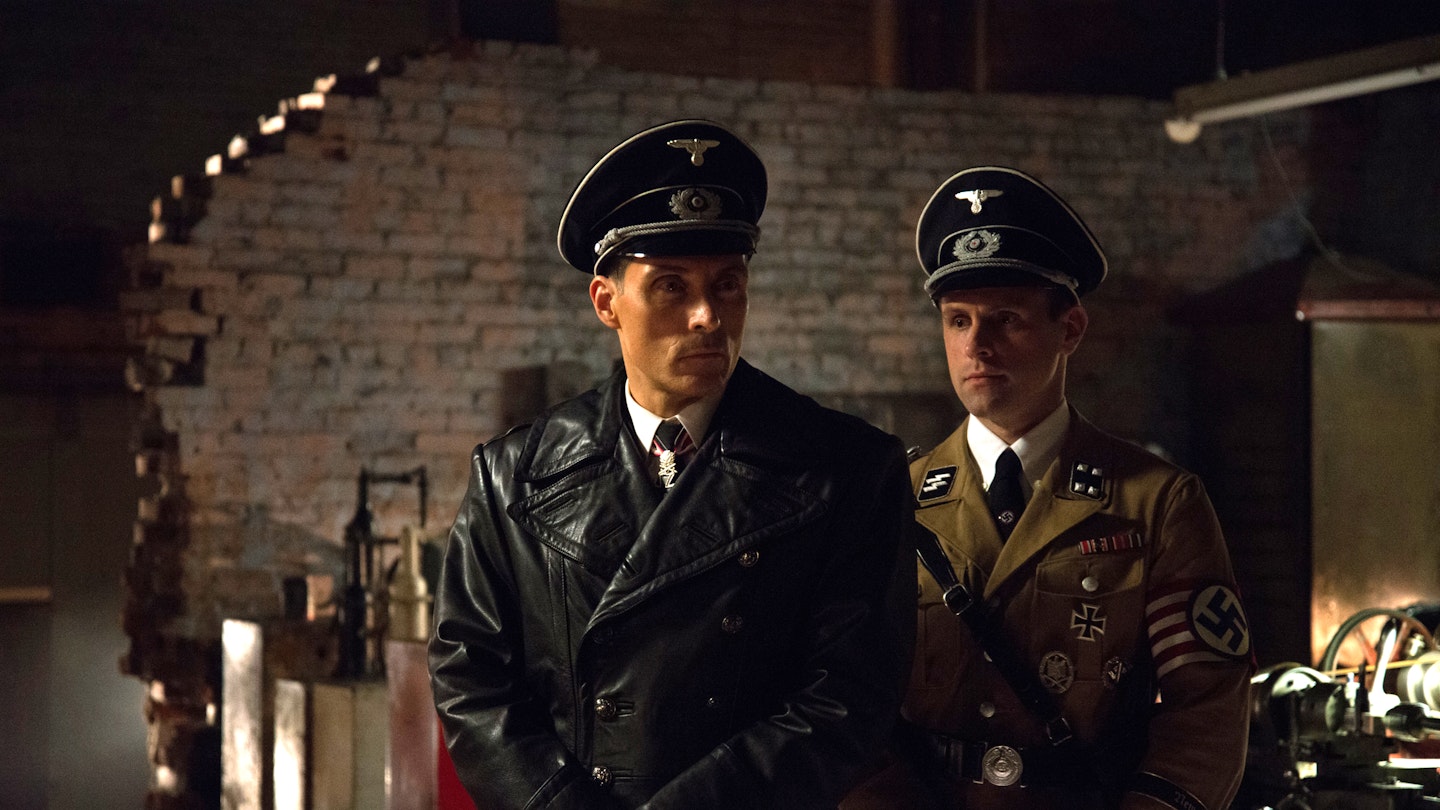While HBO’s big, shiny, humourless new headliner Westworld has hogged all the Twitter acclaim and pop theorising, Amazon’s flagship sci-fi show has quietly been getting on with its own misery-guts Dystopian business with great assurance. Faithful to the framework of Philip K. Dick’s classic — far closer, in fact, than Blade Runner or Total Recall ever kept to their respective texts — ex-X-Files alumni Frank Spotnitz has masterminded a second binge-friendly series of many guises: sci-fi period piece (this is a nuclear-powered 1962), political drama (as Hitler ails, it’s Game Of Thrones with SS factions), espionage thriller (confronting the psychology of a defeated America), and mysto-historical time-warp (think Lost where the entire USA is crackers).
What Spotnitz may not have foreseen — although there’s no ruling out Dick’s paranoid presentiment in such matters — is how chillingly relevant this vision of a fascist America was going to become. Let’s call it their Trump card.
To recap: according to Dick’s alt-history — neatly paraphrased over the opening credits using sinister Dad’s Army arrows and a death’s angel cover of Edelweiss from The Sound Of Music — the Axis of Evil was triumphant in WWII. With Washington flatted by an A-bomb, the Nazis now occupy the USA from New York to the Prairies, while the Japanese have annexed the West Coast. Across the Rockies lies the Neutral Zone as a buffer between the imperialist conquerors. The deviousness of Dick’s book is that he wasn’t reconfiguring World War II inasmuch as recasting the Cold War. As S1 closed, the Japanese had come into possession of the secrets behind the German’s “Heisenberg Device.”
A chillingly relevant vision of a fascist America.
Without leaning too heavily on CG swastikas draped over the New York skyline, S1 was a triumph of concrete world building. A Nazi-compliant Middle America proved chillingly easy to imagine, with Apple-pie Americans happily swapping “Sieg heils” from their doorsteps and state troopers brandishing those iconic armbands. The series was breathtakingly authentic.
Season Two, luxuriating in an increased budget, expands its global reach to rebuild Berlin according to thrusting, cod-Roman megalopolis of Albert Speer’s architectural blueprints and throws in some supersonic Nazi jet liners and monorails, but sensibly sticks to the claustrophobic, film noir interiors and intense back alley shoot outs. The action remains bracing rather than epic. The rare explosions sting like a slap.
The compelling spin of Dickian strangeness to what could have been the extended edition of Fatherland is the existence of a series of film reels, which once threaded into a projector (a repeated nostalgic motif) reveal history as it ought to have been with the Allies victorious. Now, as new reels come to light, so do appalling visions of a future wracked by nuclear devastation. Is this expertly faked propaganda or a true glimpse into other realities?

The new series begins with moody heroine Juliana (a mostly dull Alexa Davalos) gaining an audience with the titular wizard responsible for curating these substitute timelines. In a delightfully, hyperbolic Hopper-in-Apocalypse-Now cameo, Stephen Root channels Dick’s own paranoiac ramblings as he reveals a warehouse full of film canisters, each its own possible past or future. The high castle he claims to have in mind is just that — the mind.
One of the on-going challenges in this splendid re-orchestration of history is making satisfying sense of Dick’s trippy, alt-consciousness concepts behind it. History, he warns, can be endlessly rewritten; which, when you think about it, is exactly what Dick and (formerly) Spotnitz are doing. Tagomi, Cary-Hiroyuki Tagawa’s I Ching wielding Japanese minister anguished by forebodings of atomic calamity, appears to be able to jump timelines entirely and skulk about a sixties as-we-know-it fraught with the Cuban missile crisis and the news that Hiroshima and Nagasaki really happened (let’s not fool ourselves our timeline is so much better, runs Dick’s salutary message). Keeping track of which ‘when’ you’re flashbacking or forwarding to can be tricky. The manifold canisters playfully suggest that this is only one of many possible versions of the show we could be watching.
Halfway through S2, Spotnitz bailed over unspecified creative differences, but there has been no discernible change of direction, or lag in the retrofitted grandeur. If anything it looks ever more impressive, at its best in its most straightforward guise as an espionage thriller. In the aftermath of Heydrich’s foiled attempt to usurp the Fuhrer that climaxed S1, the narrative had effectively splintered into four locations. Away from Tagomi’s loopy-loo meditations, the central love triangle has been scattered across the history’s newly posited map.
The action is bracing rather than epic.
Juliana has gone undercover into Nazi-occupied New York on behalf of the resistance, listening into the hausfrau gossip, being set up for something big, and running the statutory excessive risks of caring too much about the local Nazi families. If only Davalos, whose haircut is a good bellwether for which timeline you’re in, were more expressive. She’s still the show’s weakest link and a droopy beacon of hope, suffering the mistaken apprehension that whispering automatically makes your dialogue more meaningful.
Back in Japanese-held San Fran, her conscience-crippled Jewish ex Frank Frink (Rupert Evans), bitter at an assumed betrayed, has been strong-armed into working for an underhand resistance himself, building up to the thrilling bombing of a Japanese HQ. While alt-flame and morally awakened (or still fooling) Nazi swine Joe Blake (Luke Kleintank) returns to Berlin, where destiny steers him in the path of big things in vast offices. Here Bella Heathcote’s delectable Aryan believer will tempt him, as will the fast-track to head office offered by his father, a high-ranking cheese in the German empire. But he can’t shake the memory of Juliana.

The heroes will variously evade or fall for the obscure plans of the Kempeitai secret police or jackbooted SS (the stereotyped mix of inscrutable Japanese and glowering Germans you have to put down to an occupational hazard of the genre) and unearth the necessary staggering revelations. Television may have cornered the market in decent scripts and daring concepts, but even here at the high end there is a growing formula to these things.
We have to trust that there is an ultimate end in sight. The project began life as a straight movie adaptation for executive producer and Dickian specialist Ridley Scott, before transmuting into a possible four-episode TV specials, and the relatively punchy novel won’t stand up to the kind of treading water to which even Game Of Thrones has fallen victim. Midseason, what was taut and moody threatens to sag into the talky and dour. The increasingly sulky Frank takes half an episode to dismantle an atomic bomb. When Joe takes an LSD trip with some Nazi richlings trying out Weimer decadence on the quiet (that favoured Dickian pursuit) you inwardly despair of more surreal padding.
Nonetheless, by the final episodes S2 winds itself up into a deftly handled and devastating end game pulling together the various threads with WWIII seemingly unstoppable. Moreover, this is without ever losing Dick’s bleak irony. Setting out their battle-plans in a borderline Strangeloveian war room, the Nazi hierarchy blithely tot up a potential death toll in the tens of millions. “And mostly Americans…” shrugs an ancient Himmler. History and narrative will inevitably spin on their heads once more, creating another TV universe where big deaths are no barrier to returning actors. But, like Lost in its deliriously good first three seasons, The Man In The High Castle thrives in the intimate details: the shock betrayals, knife-edge moral tests, and unforeseen acts of humanity that seem beyond the ken of blockbusters at the moment.
As with the great Westeros saga, it is the villains who provide the most compelling through-lines. The stand out is Rufus Sewell as the wonderfully named Obergruppenführer John Smith, the scowling Nazi puppet-master gradually revealing a heart by sad revelations of his own. More audaciously still, the show wonders if we can even feel sorry for a frail, Parkinson’s-addled Hitler (Wolf Muser) another man in a high castle obsessively bingeing on the mysterious alt-movies in the loneliness of his mountaintop retreat as if he’s got Amazon Prime.
• The Man In The High Castle Season 2 — 10 behind the scenes reveals

